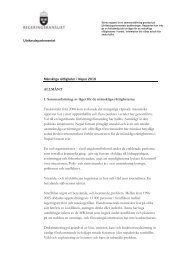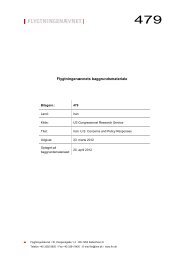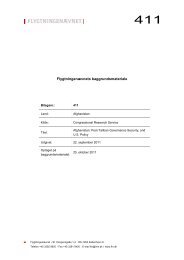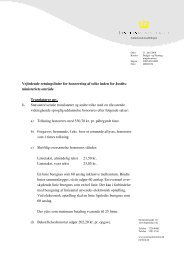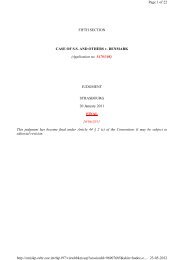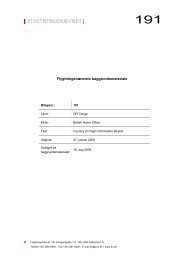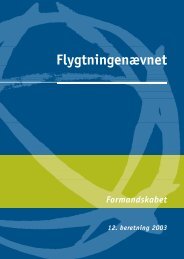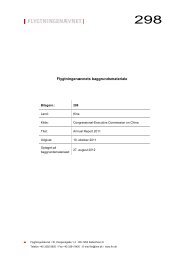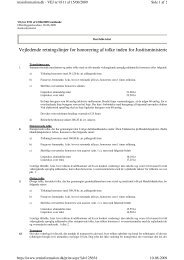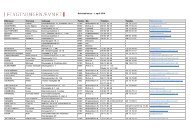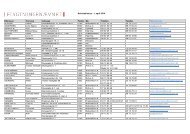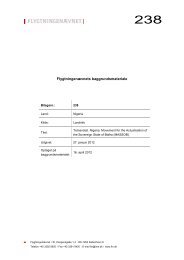Annual Report - National Human Rights Commission
Annual Report - National Human Rights Commission
Annual Report - National Human Rights Commission
You also want an ePaper? Increase the reach of your titles
YUMPU automatically turns print PDFs into web optimized ePapers that Google loves.
Annexure 12<br />
○ ○ ○ ○ ○ ○ ○ ○ ○ ○ ○ ○ ○ ○ ○ ○ ○ ○ ○ ○ ○ ○ ○ ○ ○ ○ ○ ○ ○ ○ ○ ○ ○ ○ ○ ○ ○ ○ ○ ○ ○ ○ ○ ○ ○ ○ ○ ○ ○ ○ ○ ○ ○ ○ ○ ○ ○ ○ ○ ○ ○ ○<br />
○<br />
has to be taken accordingly. This includes traffickers, transporters, financiers, abettors, conspirators<br />
and all those who are involved, by their acts of omission and commission, which lead to<br />
exploitation. The group also includes the clients who abuse and exploit women and children.<br />
The study has shown that the majority of them look for sex with children and, therefore, such<br />
clients have to be dealt with stringently. The burgeoning demand for child sex, both brothelbased<br />
and non brothel-based has to be aborted ruthlessly. Since child sex amounts to rape even<br />
with consent (vide s.375 IPC), the clients need to be booked under substantive law too. At the<br />
same time, the study has shown that there are some clients, especially teenagers, who come to<br />
brothels for sex mostly out of curiosity or lack of guidance. These clients could be dealt with by<br />
counselling and education. They should be made aware of women’s rights, human rights and<br />
child rights. Such programmes for action can be planned only after understanding the demand<br />
scenario, which needs to be mapped in detail by involving the clientele. Since this study has<br />
brought out different patterns in different states, it would be appropriate that such micro-level<br />
mapping is carried out by the district administration, as mentioned above, so that necessary steps<br />
can be locally initiated, by involving all the stakeholders.<br />
Addressing the Vulnerabilities<br />
The most important issue in prevention is to address the vulnerabilities of women and children.<br />
Economic and social empowerment are the cornerstones for prevention of trafficking. The<br />
different policies, programmes and projects of the government with respect to the various<br />
departments need to be dovetailed in such a way that they necessarily have an anti-trafficking<br />
component, which would be integrated into the larger plan of action by the concerned government<br />
department. Self Help Groups (SHG) and PRIs can be effectively utilised for this. The Tamil<br />
Nadu example shows that PRIs can be very effective in the empowerment of women and children<br />
at the grassroots. The role of corporates has been discussed earlier. They have an important role<br />
to play in prevention of trafficking by addressing the vulnerable sections of society. Since the<br />
study shows that the majority of the existing intervention programmes are focused on the supply<br />
side, there is a need to reorient the focus to the demand side too. The study has shown that<br />
trafficking has caused an exodus-like situation of women and children from the economically/<br />
socially oppressed sections of society and those affected by natural/man-made calamities. When<br />
such circumstances prevail, the girl child and women become highly vulnerable. In such situations<br />
it has become a common feature to convert the girl child, who is considered a liability, into an<br />
asset by selling her or abetting in trafficking her. Therefore, preventive strategies need to focus<br />
on such vulnerabilities. Developmental programmes should specifically address social and<br />
economic empowerment of these vulnerable sections. There is a need for significant inputs<br />
through education, public awareness and community involvement.<br />
Public Awareness Campaigns<br />
Lack of awareness of human rights of women and children is the springboard from which the<br />
exploiters gain impetus. Once the vulnerable sections are adequately aware of their rights, they<br />
themselves will feel strengthened. Though the public relations department of the government<br />
276<br />
<strong>National</strong> <strong>Human</strong> <strong>Rights</strong> <strong>Commission</strong> <strong>Annual</strong> <strong>Report</strong> - 2004-2005<br />
AR-Chapter-1-19-10-6-06.p65<br />
296<br />
7/17/06, 6:31 PM



